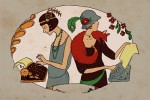 Greetings and welcome, one and all, to the inaugural Lair of the Evil Drs Brain, where we “invite” (i.e. conduct virtual kidnappings of) other writers and artists for a chat (which occurs right after they stop demanding to be released and saying ‘Who are you and why I am in a comfy wingback chair?’and ‘These are not my pyjamas!’).
Greetings and welcome, one and all, to the inaugural Lair of the Evil Drs Brain, where we “invite” (i.e. conduct virtual kidnappings of) other writers and artists for a chat (which occurs right after they stop demanding to be released and saying ‘Who are you and why I am in a comfy wingback chair?’and ‘These are not my pyjamas!’).
Our first victim, errr, guest is the really rather clever China Miéville, he of such tomes as King Rat, Perdido Street Station, The City and The City, and the most recently excellent Embassytown. We all know he’s got a brain the size of a planet, with an IQ that has more digits than Warren Buffett’s bank statement – random thought: Genius Deathmatch, Miéville versus Stephen Fry? – and so in order to make him appear less intimidating and more approachable we gave him footie pyjamas and a cup of warm cocoa. See? Instantly fluffy and non-threatening. 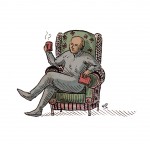
And so without further ado or incriminating commentary, let us launch the Lair. *shattering of champagne bottle against the hull, sound of two Evil Brains crying at the waste of good bubbly*
Dr Angela: Welcome, China and thanks so much for joining us in the Lair of the Evil Drs Brain. I’d like you to meet the other half of the Brain, Lisa Hannett. You will note that I am Ralph Wiggam to Lisa’s Professor Frink.
Dr China: I’m delighted and honoured to be invited.
Dr Angela: Lisa, if you’d like to start?
Dr Lisa: Thanks, Brain. China, I thought we’d start with a couple of questions about Embassytown, then move on to a couple general questions about your writing habits.
Dr China: Sure.
Dr Lisa: Ursula Le Guin lavished praise on the book in her Guardian review, which led me to think: are there echoes of The Left Hand of Darkness in Embassytown? Has Le Guin’s writing been a source of inspiration for your own work?
Dr China: Certainly, and certainly. I don’t know that I was specifically riffing off LHOD, but Le Guin has been a very big figure in my mind, yes, for a long time. Her anthropological approach and critical take on colonialism, her use of language, all the things you would expect. In a way, Embassytown was in part a reversed homage to her (I don’t mean an anti-homage, I mean a sincere homage reversing terms) in the sense that one of the most incredibly valuable pieces of furniture she came up with for SF is the ansible, allowing instantaneous communication. I wanted to posit a universe that was profoundly ansibleless, in which communications were the opposite of instantaneous, and the peculiarities of politics — especially colonial politics — rule at a distance and extended lag would mean a return to a kind of maritime empire style of the 18th and early 19th Century, which is why the immer is maritime-esque.
Dr Lisa: I love the concept of the reverse homage. And I’m really interested in the problems of communication — so, without knowing it, you’ve actually anticipated my next question… Which, incidentally, begins with a quote from David Malouf. Have you read any of his short stories?
Dr China: To my shame, no. Time-organisation fail. One of my too-many lacunae.
Dr Lisa: You won’t regret getting a copy of his Complete Stories. Brilliant, brilliant stuff. 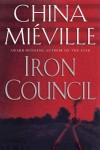 Anyhow, there’s a line in David Malouf’s wonderful story ‘The Only Speaker of His Tongue’ that goes: “When I think of my tongue being no longer alive in the mouths of men a chill goes over me that is deeper than my own death, since it is the gathered death of all my kind.”
Anyhow, there’s a line in David Malouf’s wonderful story ‘The Only Speaker of His Tongue’ that goes: “When I think of my tongue being no longer alive in the mouths of men a chill goes over me that is deeper than my own death, since it is the gathered death of all my kind.”
Dr China: That is rather splendid indeed.
Dr Lisa: And I was thinking that this line resonates with the problems of communicating with the Hosts in Embassytown… With that in mind I wondered: do you think the transformation/degeneration of language is a symptom (or catalyst?) of dystopian societies in science fiction?
Dr China: Well, I guess in terms of a traditional trope, yes. The most obvious example to me would be Riddley Walker by Russell Hoban, but also I think of the language especially towards the end of the surpassingly strange and rather underrated (imo) Alfred Bester book, Golem 100. The thing is, that sense of language as a speaking of society, so the collapse of language mirrors and/or causes the social collapse is a strong and interesting idea to riff off in fiction. It is not, however, the way I think actual language works in the real world. (I’ve seen more than one person say Embassytown is a riff on the Sapir-Whorf hypothesis, which I guess to a certain extent it is. But that doesn’t mean I don’t know that the S-W hypothesis is bogus. I do know that, and it is.) So — as a literary tradition, yes. Often brilliantly. But I wouldn’t want that to seem to be mapped out into actual sociolinguistic prescription.
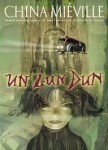 Dr Lisa: I was also thinking that communication doesn’t come strictly down to words… There’s body language, charades if need be — visual forms of communication. But it’s fascinating to see the perceived restrictions of language, particularly in a written medium like fiction.
Dr Lisa: I was also thinking that communication doesn’t come strictly down to words… There’s body language, charades if need be — visual forms of communication. But it’s fascinating to see the perceived restrictions of language, particularly in a written medium like fiction.
Dr China: One of the rather interesting things about A Clockwork Orange, whatever else one thinks of the book, is that the ‘degenerate’ language is anything but. It is vibrant, creative, brilliantly poetic. Dystopias will have their poetry just as much as anywhere else. The notion of language ‘degenerating’ is rather Orwellian to me, and I don’t mean that as a compliment. Orwell’s thinking about language, both in 1984 and in his incredibly famous and influential ‘Politics and the English Language’, seems to me by some way one of the weakest parts of his work.
Dr Lisa: I think Riddley Walker is equally vibrant…
Dr China: Yes, I *totally* agree. What I can’t tell is whether it is ‘supposed’ to be, or if that creeps in behind the author’s/text’s back. Not that it matters. Language in Embassytown is, I am as sure as I can be, impossible. (I know for some readers, that pushes them out of the text. I understand that.) I don’t think that precludes it being an interesting and even, I hope, exciting thing to think with.
Dr Lisa: I totally agree. Complex language — difficult language — for me doesn’t preclude a text being interesting/engaging. In fact, if it reinforces the point of the narrative, then it is actually something to be sought in the books I read…
Dr China: It’s different strokes for different folks. There are criticisms of books that I take on board, sometimes that make me wince. Then there are some that, while of course it’s entirely the business of the reader whether or not this makes them want to put a book down, simply operate according to criteria wholly at right-angles to any way in which I find books engaging, and so when they are levelled at me, I can only shrug, not I hope defensively so much as saying, we are speaking in very different terms. ‘This protagonist is boring’, is a devastating criticism. ‘This protagonist is unlikeable’ is to me completely irrelevant. Similarly: ‘Sometimes I didn’t understand what was going on’ is, to me, simply not a criticism. I like books that I don’t completely understand, often, that push me in and out of comprehension, with which I have to wrestle.
Dr Lisa: I could speak about the fluctuations of language endlessly, but I’m aware of the clock ticking away, so I thought we’d change gears now and talk about some of your general writing habits.
Dr China: As you wish!
Dr Lisa: You are remarkably prolific in terms of publishing, but when it comes to your writing process are you a tortoise or a hare? In other words, do you write quickly or slow-and-steady? Do you consider each word you put down in the drafting stage — construction of metaphors and so on — or do you make a dash for the finish line, and take care of that sort of thing in rewrites?
Dr China: It varies enormously project to project. (I don’t feel particularly prolific, btw, I feel very frustrated with how long it takes me to get to and through certain things.) I tend to write in very intense bursts, of many hours at a time, through the night, punctuated by days in which I don’t do much writing at all. These days, I feel like I’m slower at a sentence by sentence level. Which is fine by me — it goes back and forward. I do work very hard at the prose, in the way you’re describing, and more so the older I get. But then, some projects just flow off the pen, others one has to wrestle with. It depends whether it’s a short story or a novel, whether I’m typing or handwriting, what the story is, etc, etc. Sorry to be vague, but I’m not someone who has a very formal ‘method’.
 Dr Lisa: Not vague at all. I find your prose quite considered, the detail elaborate and something that *seems* to take a lot of time — so I wondered if you were one of those writers that manages to get such great stuff down in an instant. 10,000+ words a day, sort of thing. In which case, I would turn green. I’m also opposed to the whole “You must write every day” mantra. Not everyone works effectively that way. Some, as you do, write in bursts. Others will write based on the project at hand.
Dr Lisa: Not vague at all. I find your prose quite considered, the detail elaborate and something that *seems* to take a lot of time — so I wondered if you were one of those writers that manages to get such great stuff down in an instant. 10,000+ words a day, sort of thing. In which case, I would turn green. I’m also opposed to the whole “You must write every day” mantra. Not everyone works effectively that way. Some, as you do, write in bursts. Others will write based on the project at hand.
Dr China: Pretty much the only constant thus-far has been intense bursts. I’ve not historically been someone who can write for a couple of hours every morning then calmly move on to other things. Though I’m trying to see if I can. In answer to this, I *have* written 10,000 words in a day once, but only once. I tend to do a lot of preparatory work, then might write anything between 1000 to 4000 in a good day. Which will of course need revising, usually extensive cutting, but the amount of that revision varies enormously book to book. Kraken I wrestled with extensively and many times. For The City and the City, the prose came out very close to its final iteration. And on the ‘Write Every Day’ thing? Yes. What you said.
Dr Lisa: So my next ‘method’ (sort of) question, is: you’ve mentioned that you’re interested in writing a novel in every genre, so is there any sign of weird Westerns in your future?
Dr China: Iron Council is a western, in my opinion. Certainly it was intended to be — I read a lot of westerns for it. Currently I’m more interested in Regency Romances.
Dr Lisa: Oooh! Are you reading lots of Regency fiction at the moment for research?
Dr China: Might be. I couldn’t possibly confirm or deny said allegation. Talking about unfinished work is *so* asking for trouble, in my opinion.
Dr Lisa: Ha! OK, Georgette Heyer or Jane Austen? Preferences?
Dr Angela: I’ve spoken to four people in the last week who are reading Georgette Heyer at the moment.
Dr China: Oh, Heyer. Austen doesn’t count.
Dr Lisa: That is the correct response. We may now continue with the interview.
Dr China: If you’re reading in a genre, it doesn’t count if you’re reading only the outliers  who are also accepted by the mainstream. It’s like someone saying they are ‘getting into SF’ and reading Le Guin, Bradbury and PKD. Fine writers all, but if you are not reading EE Doc Smith and Mary Gentle then you’re cheating.
who are also accepted by the mainstream. It’s like someone saying they are ‘getting into SF’ and reading Le Guin, Bradbury and PKD. Fine writers all, but if you are not reading EE Doc Smith and Mary Gentle then you’re cheating.
Dr Lisa: Agreed. So, to avoid getting into nitty-gritty questions about the Miéville Regency Romance, shall we move on to a couple of frivolous questions?
Dr China: Indeed, frivol me.
Dr Lisa: In the 90s, William Gibson produced a work called Agrippa, which was stored on a floppy disk programmed to erase itself after a single reading, and accompanied by an artist’s book which was treated with photosensitive chemicals so that its text would fade as soon as it was exposed to light. If you were to write a text that would disappear after one reading, to whom would you send it and what would it be about?
Dr China: Oooh…. Let me think for five seconds.
… *Brains make superfast tea and toast marshmallows using heat generated by enormous China cerebral cortex*
 Dr China: I wouldn’t. I just wouldn’t. I am too invested in the book to which one can return. I admire the ineluctable ephemerality of the Gibson project (which, as I recall, didn’t work, because people just cheated and transcribed it) qua art event, but as a writer, it makes me want to cry.
Dr China: I wouldn’t. I just wouldn’t. I am too invested in the book to which one can return. I admire the ineluctable ephemerality of the Gibson project (which, as I recall, didn’t work, because people just cheated and transcribed it) qua art event, but as a writer, it makes me want to cry.
Dr Lisa: I love the idea of the Gibson project (comment on the fallibility of memory and the whole bit) but like you, I am attached to the permanent object. And, yes, people transcribed it, which was totally cheating.
Dr China: Disrespectful, right?
Dr Lisa: Yes. If the idea was for it to be ephemeral, then it should’ve been left to die.
Dr China: Agreed. Which is why it’s the kind of project I wouldn’t do. All love and respect to Gibson notwithstanding. Maybe it’s ego, I don’t know.
Dr Lisa: One final frivolous question from me, then I’ll pass it over to Angela.
Dr China: Go for your bad self.
Dr Lisa: What is the first song lyric that pops into your mind? Ready… Go!
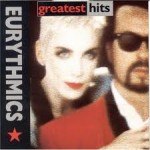 Dr China: ‘When will you make up your mind?’ Conditioned Soul, the Eurythmics. Dammit! Do over! Want something cooler! Uh, I mean, ‘Fight the powers that be’! Public Enemy.
Dr China: ‘When will you make up your mind?’ Conditioned Soul, the Eurythmics. Dammit! Do over! Want something cooler! Uh, I mean, ‘Fight the powers that be’! Public Enemy.
Dr Lisa: So does that make me uncool for having ‘Here comes the rain again’ stuck in my head for days?
Dr China: Here’s the thing with the Eurythmics. They were awesome.
Dr Lisa: Indeed.
Dr China: They became a bit meh, though I defy anyone not to love Annie Lennox. But that first album is a triumph of popular experimentalism. It’s total genius. And Conditioned Soul is one of those B-sides that’s better than the A-side.
Dr Lisa: It is a shame how meh they became. And Annie Lennox now singing Christmas carols makes me a bit sad. Though her ‘God Rest Ye Merry Gentlemen’ is cool. For a Christmas carol.
Dr China: I… haven’t heard it.
Dr Lisa: Good… And with that, I’ll pass the mic over to Angela. Thanks so much,China!
Dr China: Absolute pleasure.
Dr Angela: Hello! For the record, I’ve had Sweet Dreams in my head after watching Episode 1 of Grimm.
Dr Lisa: Eurythmics triumvirate!
Dr Angela: Or very sad 80s victims… But on to the questions. You’re a fan of the big word, both in speaking and writing — you use them without fear that a reader won’t understand them when a lot of other writers seem to be dumbing down their texts. Is language deteriorating? Do you have to fight to keep the big words in and hope that readers will learn something in spite of themselves? Is it harder to write the way you want to or are you at the enviable point in your career where editors leave you alone?
 Dr China: Well, that’s more than one question. I don’t *want* editors to leave me alone. Being edited is a privilege and a really good and necessary thing. I want to be edited and I want to work with them.
Dr China: Well, that’s more than one question. I don’t *want* editors to leave me alone. Being edited is a privilege and a really good and necessary thing. I want to be edited and I want to work with them.
Dr Angela: True. You want an editor to work with you and make the MS the best it can be. So did you ever have to fight to keep the big words in and hope that readers will learn something in spite of themselves?
Dr China: In broader terms, the thing about ‘big words’ — do you think it’s true that writers are dumbing down their texts? I’m not sure. Do you think there was a time when texts were more, what, haute-prose-y? I think people are perfectly capable of making sense of all sorts of stuff. If it’s the case that I or any other writer uses a word one doesn’t know, why should that be a problem? I regularly read books with words I don’t know. And when I was a kid it happened all the time. It can be — it isn’t automatically, of course — part of the joy. Looking things up, learning, chewing on vocabulary that takes an effort. Fantastic. That was the case 25 years ago when I was a teenager. (Pauses aghast at own age.) It’s more the case now, when it is easier than ever to look things up that you don’t know. It is absolutely easy. I am *not* putting things in the hope that readers ‘will learn something in spite of themselves’, though. That isn’t my job. I use what seems to me the best word at any particular moment for the job I want to do, which will be a job of precision, of nuance, of insinuation, and sometimes of a degree of estrangement.
I heard a writer on the radio the other day and she said that the most important thing she’d learnt from her creative writing MA was to write the books that readers want to read. That made me really sad. I hate that approach. I’ve said it many times, and I apologise for repetition, but I think our job should be to make readers want to read the books that we write. Sometimes we’ll succeed, sometimes we won’t. ‘You use too many long words’, or usually more pithily ‘You are pretentious’, or ‘You are a wanker’ is one of those criticisms that veers off at right-angles to me. If it means a reader doesn’t like the books, that’s their business, of course, but ‘using words’ *qua criticism* makes no more sense to me than ‘writing an unlikeable protagonist’. These are simply not, to me, prima facie demerits.
Dr Angela: It’s been said that English doesn’t borrow from other languages, but rather  follows them down dark alleys, mugs them and goes through their pockets for loose grammar. When you write, how much leeway do you allow yourself in playing with language? Making up words and so forth? What do you want to achieve when you’re playing with language?
follows them down dark alleys, mugs them and goes through their pockets for loose grammar. When you write, how much leeway do you allow yourself in playing with language? Making up words and so forth? What do you want to achieve when you’re playing with language?
Dr China: I *love* making up words. I love playing with language. I love thinking about the cadences and rhythms, fucking around with grammar, jury-rigging signs. Why would one not? That question was a bit of a gimme, wasn’t it? Kind of you. 😀
Dr Angela: One of the reasons I love your work is that the made-up words are strangely recognisable!
Dr China: Well, I love that. Part of the attempt is to create a sense of a word that resonates like something half-forgotten, rather than wholly new.
Dr Angela: It’s great — it’s almost like a forgotten kind of Latin.
I’m mindful of time, so let’s move on to the next question: You’ve written some outstanding female characters — Lin and Derkhan in PSS; Bellis and the female Lover in The Scar; Kath and Marge in Kraken; Zanna and Deeba in UnLunDun. What’s in your mind when you’re writing a woman? Is there any fear?
Dr China: Not in particular, no. I hope I do an OK job, is all, but I think sometimes the anxiety about writing women if one is a man, which often comes from a good place, of course, to not efface the particularities of gender as a social phenomenon, can tip over into a kind of excessive and paradoxically gendered sense of Woman-as-Other. That’s not to say I don’t want to do the best I can and to not embarrass myself on gender terms, and I hope I’ve succeeded — it’s just to say that fretting excessively isn’t, I suspect, the best way to go about it. You know women? They’re like *totally* people, not unlike men! I know, right?!
Dr China: I think for me the way in is to think carefully about gendered society, rather than about ‘women’ and ‘men’.
Dr Angela: Language is loaded whether you’re a male or female writer, so I guess it’s about being ‘aware’.
Dr China: Gender is highly important and highly political. But *women* needn’t be a particular narrative problem, FFS.
Dr Angela: I’m quite fascinated by some of your characters; how they remain mysteries, keep their secrets. Isaac is very much an open book, but someone like Tyador or Uther — indeed the Lovers — always feels as though they are still hiding things. Not that they are unfinished or under-developed characters, but as if they have made the choice to keep part of themselves back from the reader. Is this a conscious choice on your part as the writer or does it just happen?
Dr China: No, I like not knowing everything going on in a story. I know it drives some readers batshit, but to me it’s always been, as a reader, part of the pleasure. Both at a level of character, and at a broader level too. Some readers didn’t like TC&TC on the grounds that it wasn’t explained how Beszel and Ul Qoma came to be in the relation they were. For me, that was precisely a strength. Uncertainty doesn’t, to me as a reader, push me out of a text. Nor does constitutive ambiguity, necessarily.
Dr Angela: Absolutely. The whole thing about TC&TC was that that idea was new and it didn’t get explained — it didn’t need to be. One last question: is leisure reading a dim, precious memory or do you make time to read for fun? If yes, who do you read when you want to escape?
Dr China: I try to make time to read, but I find it very hard, particularly when I’m working. So my reading slows down drastically when I’m in the middle of writing something. It’s the single thing about writing professionally that’s a bit of a bummer. Who I read depends very much on the moment. Recently I’ve been swallowing down Barbara Comyns, with great joy.
Evil Drs Brain: Thanks so much for your time, China!
Dr China: Thank you guys so much.
Postscript: For the record, Dr Miéville was returned unharmed to London, although not necessarily to his own flat – malfunctioning vortex manipulators are a bitch. He did insist upon keeping the footie pyjamas.
Many thanks to the lovely Kathleen Jennings for her portrait of China. She would like everyone to know that we forced her to depict Dr M in footie pyjamas. We would like everyone to know that she did accept booksheesh* as payment for her artistic services, in the form of a hard cover copy of Embassytown.
* Lair Glossary
booksheesh (noun): a form of payment/bribe in the form of a book.



16 Responses to China Miéville in Da Lair